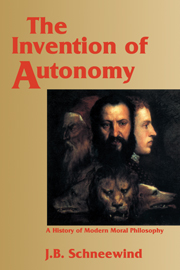Book contents
- Frontmatter
- Contents
- Preface
- Acknowledgments
- A note on references and abbreviations
- Introduction
- Part I The rise and fall of modern natural law
- 2 Natural law: From intellectualism to voluntarism
- 3 Setting religion aside: Republicanism and skepticism
- 4 Natural law restated: Suarez and Grotius
- 5 Grotianism at the limit: Hobbes
- 6 A morality of love: Cumberland
- 7 The central synthesis: Pufendorf
- 8 The collapse of modern natural law: Locke and Thomasius
- Part II Perfectionism and rationality
- Part III Toward a world on its own
- Part IV Autonomy and divine order
- Epilogue
- Bibliography
- Index of names
- Index of subjects
- Index of biblical citations
2 - Natural law: From intellectualism to voluntarism
Published online by Cambridge University Press: 05 June 2012
- Frontmatter
- Contents
- Preface
- Acknowledgments
- A note on references and abbreviations
- Introduction
- Part I The rise and fall of modern natural law
- 2 Natural law: From intellectualism to voluntarism
- 3 Setting religion aside: Republicanism and skepticism
- 4 Natural law restated: Suarez and Grotius
- 5 Grotianism at the limit: Hobbes
- 6 A morality of love: Cumberland
- 7 The central synthesis: Pufendorf
- 8 The collapse of modern natural law: Locke and Thomasius
- Part II Perfectionism and rationality
- Part III Toward a world on its own
- Part IV Autonomy and divine order
- Epilogue
- Bibliography
- Index of names
- Index of subjects
- Index of biblical citations
Summary
The belief that human action should be guided by natural laws that apply to all people, no matter what their race, sex, location, or religion, originated outside of Judaism and Christianity. Once accepted into Christian thought, the idea of natural law became central to the European way of understanding morality. In this chapter I indicate briefly the origins of natural law theory and review its classical exposition in the work of St. Thomas. Then, after presenting some of the major points on which critics disagreed with St. Thomas, I go on to discuss the outlook on morality of the two main founders of the Protestant Reformation, Luther and Calvin, for whom voluntarism was of central importance. These different Christian interpretations of natural law were far more significant for the development of modern moral philosophy than the ethical writings of Plato or Aristotle.
Origins of natural law theory
The concept of natural law is at least as old as the Stoics. It was developed as the city-state was ceasing to be the dominant political form of Mediterranean life and was transmitted by the Stoic school to the Romans. In Rome the idea came into fruitful contact with actual legal practice. Roman law covered all the dealings of Roman citizens in great detail. As Rome expanded, its citizens increased the amount of business they did with foreigners.
- Type
- Chapter
- Information
- The Invention of AutonomyA History of Modern Moral Philosophy, pp. 17 - 36Publisher: Cambridge University PressPrint publication year: 1997



